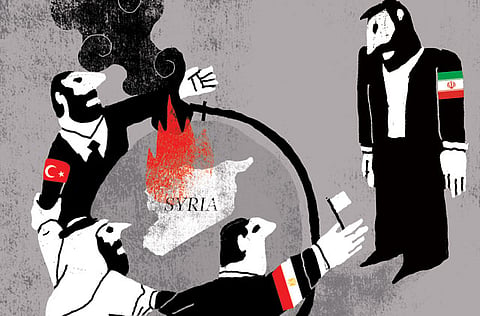Crucial change in Iran’s stance on Syria
Iran realises that support for doomed Al Assad will be a disaster

A crucial shift is taking place in the Middle East towards the conflict in Syria. Egyptian President Mohammad Mursi’s call for Arab-Iranian-Turkish dialogue over the crisis and a safe transfer of power in Syria has been well received in Turkey and Iran. All these countries have a powerful interest in making such a dialogue work, which makes the chances of success far greater.
The context is clear enough. The Syrian rebels have made major gains. The revolution moved to a new phase after the July 18 attack in Damascus, which took the lives of several top security officials, a huge morale boost to the Free Syrian Army (FSA). It has since tried to secure a number of Syrian border crossings with Turkey and Iraq, and its fighters also established a military presence in Damascus and Aleppo, two cities which had been under the absolute control of the regime.
As for the regime, it has witnessed a collapse of morale, represented by a raft of major defections — the most important being that of the former prime minister and a number of military and security leaders. This has created considerable alarm within the Bashar Al Assad regime, provoking savage responses, as demonstrated by the unprecedented use of air power to bomb population centres. The outcome has been a startling rise in casualties and an unprecedented flow of refugees to neighbouring countries. Al Assad’s interview this week asking for more time to defeat the rebels suggests the bloodshed will get even worse.
Iran recognises now that it is just a matter of time before the Al Assad regime falls, and its realisation that unlimited support for him will be a disaster has led Tehran to search for an exit from this Syrian quagmire.
Axis of resistance
Syria represented the cornerstone of the so-called ‘axis of resistance’. The exit of Hamas from Damascus last year, following the regime’s crackdown, was a huge blow to this axis, exposing a sectarian divide. Most regional parties who now support the Alawite regime in Damascus are Shiite, from Tehran to the Nouri Al Maliki regime in Iraq and Hezbollah in Lebanon. This has alienated Iran from the Sunni majority in the region and worldwide, at a time when the US and Israel threaten a military strike against its nuclear facilities.
Hence the Egyptian initiative gave Iran an important opportunity which it seized immediately. The participation of Morsi in the non-aligned alliance in Tehran offers an important diplomatic opportunity for Iran.
This week’s Non-Aligned Movement summit, also attended by UN Secretary-General Ban Ki-moon, took place against the background of international failure to reach consensus on Syria given the positions taken by Russia and China on the one hand, and because of the hesitancy of the US to allow the flow of more effective anti-aircraft weapons to the FSA, fearing that these weapons may present a future danger to Israel’s security. This position has clearly signalled to Syria’s neighbours the need for an acceptable outcome to the bloody conflict before it risks engulfing the entire region.
As for Turkey, it is beginning to realise that the Syrian crisis could harm its own national security, not least with the escalation of hostile Kurdish activities against Turkey in the Syrian border provinces. Not only that, but the collapse of Al Assad would cause a huge security and economic burden if there were no agreement with Iran and the Arab states over a smooth transition. The common fear is that Syria could become the battleground for a regional proxy war, with various players seeking to secure their interests by supporting allied military groups in a conflict lasting years.
Regional agreement
The Arab states also favour a regional agreement of which Iran will be a part. Despite growing fears over Iran, the Gulf states don’t wish for a confrontation with Tehran because the costs of such a conflict would be huge. The reception given by Saudi Arabia to Mahmoud Ahmadinejad in the recent Islamic solidarity conference in Makkah, and the announcement by King Abdullah Bin Abdul Aziz of the establishment of a centre of dialogue between Islamic schools of thoughts in Riyadh, signals that the Gulf states have no desire to further strain relations with Iran.
The Egyptian initiative is important because it is the first by its newly elected civilian president, and also because it comes after Mursi was able to establish his authority internally. This gives his initiative greater weight abroad and signals a return to Egypt playing its historic leading role.
Egypt today appears well qualified to take a balanced position: it does not carry any baggage; and given that it represents the spirit of the Arab spring, it has moral authority. All this has pushed the regional parties to respond positively.
We should also not ignore the position of the Syrian people. They will not accept any solution that does not guarantee Al Assad’s departure. However, Mursi made clear that he is against any military intervention in Syria, which resonates well in Tehran. And above all, it is imperative that Iran recognises this is the last opportunity to correct its strategic error of supporting a regime that is about to fall.
— Guardian News & Media Ltd
Wadah Khanfar is a former director-general of Al Jazeera television network.
Sign up for the Daily Briefing
Get the latest news and updates straight to your inbox



